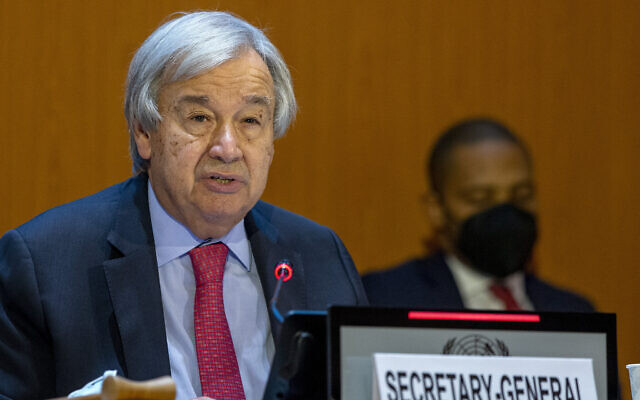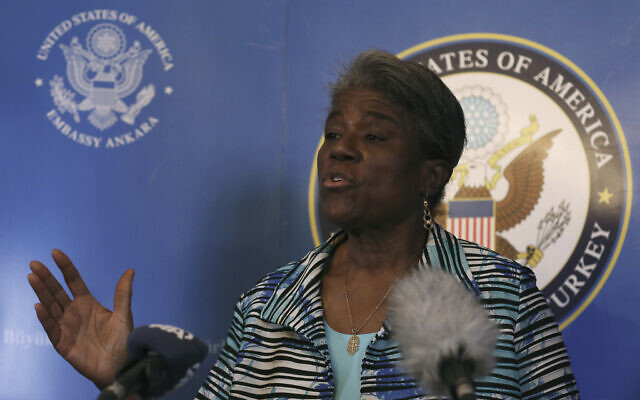GENEVA (AP) — The United Nations on Monday drummed up more than $1.2 billion in emergency pledges to help 11 million Afghans in their homeland and millions of others in the region, the UN human rights chief called the Taliban’s first expressed concern about Steps towards establishing power in a troubled and impoverished country.
At the first high-level conference on Afghanistan since the Taliban came to power a month ago, Western governments, large traditional donors and others announced a pledge that has raised more than $606 million to the United Nations by the end of the year. was asking for cover. Protecting Afghans from humanitarian disaster.
UN Humanitarian Chief Martin Griffiths announced at the end of the ministerial meeting that more than $1.2 billion in humanitarian and development aid had been promised. He said it included the $606 million sought in a “flash appeal” but also a regional response to the Afghan crisis, which UN refugee chief Filippo Grandi spoke about after arriving in Kabul on a previously unannounced visit .
He wrote on Twitter that he would assess the humanitarian needs and condition of 3.5 million displaced Afghans, including more than 500,000 displaced this year alone.
Officials from the UN refugee agency, UNHCR, have expressed concern that more Afghans may seek refuge in neighboring Pakistan and Iran, both of which already have large numbers of Afghans who fled their countries during previous decades of war.
Griffiths urged donors to convert Monday’s pledges into cash contributions as soon as possible, saying the funding “will throw a lifeline for Afghans” who lack food, health care and security. He said the meeting showed solidarity with the Afghan people, but added that “Afghanistan faces a long and difficult road ahead” and it is “far from the end of the journey.”
There are fears that Afghanistan could be headed for famine and economic collapse following last month’s chaos, which saw the Taliban oust the government from power as US and NATO forces pulled out of a 20-year war.

United Nations Secretary-General Antonio Guterres addresses his statement during the high-level ministerial event on the humanitarian situation in Afghanistan, at the European Headquarters of the United Nations in Geneva, Switzerland on September 13, 2021. (Salvatore Di Nolfi/Keystone via AP)
“The people of Afghanistan need a lifeline,” UN Secretary-General Antonio Guterres said at the opening of the conference. “After decades of war, suffering and insecurity, they are facing perhaps their most dangerous times. Now is the time for the international community to stand with him. And let us be clear that this conference is not just about what we will give to the people of Afghanistan. It’s about what we owe.”
He said one in three Afghans do not know where their next meal will come from, poverty rates are “rising” and basic public services are crumbling. A severe drought is threatening the upcoming crop, and hunger is increasing.
The UN’s World Food Program says Afghans are running short of cash to buy food, much of which – such as wheat flour – is imported. Frozen foreign exchange and a paralyzed state budget have taken away people’s money, as have food and fuel prices soared.
Like many other UN-led donor conferences, some countries injected more funding, while others highlighted commitments already made. German Foreign Minister Heiko Maas announced plans to pour 500 million euros ($590 million) to Germany in Afghanistan and its neighboring countries, but details were not immediately provided. Denmark said it would give an additional $38 million and Norway had promised $11.5 million.
At the same time, officials suggested that future aid could be affected by Taliban rule.
US Ambassador to the United Nations Linda Thomas-Greenfield said the US is “committed to providing humanitarian assistance” for Afghans and will add $64 million in new aid to the United Nations and allied organizations. This brings the total number of US aides to Afghanistan this fiscal year to $330 million, he said.
“We need the verbal and written commitments made by the Taliban to uphold the operational rights of humanitarian agencies and the treatment and rights of minority groups, women and girls,” she said by video message. “Words are not good enough. We must see action. The international community is united in this message.”
Germany’s Maas also spoke to the Human Rights Council in Geneva, saying the world had a “moral obligation” to help Afghans. But he also said that the Taliban’s level of respect for human rights, especially for women and girls, would be “a benchmark for us and our partners in determining our future engagement with a new Afghan government”.
He criticized the Taliban’s decision to exclude other groups from the recently announced interim government, saying it was “not the right sign” for international cooperation and stability.

Linda Thomas-Greenfield, US Ambassador to the United Nations, speaks to the media on June 4, 2021 in Ankara, Turkey. (Burhan Ozbilisi/AP)
The world is watching closely to see how Afghanistan can be different from when Islamic militants first came to power from 1996 to 2001 under the Taliban government. During that era, the Taliban enforced a strict regime by interpreting Islamic law. Girls and women were denied education and excluded from public life.
Initially, after seizing power on 15 August, the Taliban promised totality and a general amnesty for former opponents. But many Afghans are deeply intimidated, especially by the Taliban’s initial moves. The group formed an all-male, all-Taliban government, despite initially saying they would invite wider representation. Taliban police officers beat up Afghan journalists and violently dispersed the women’s protest.
The UN human rights chief, Michelle Bachelet, warned of a “new and dangerous phase” for Afghanistan, as she rebuked the Taliban for a disconnect between their words and actions.
Speaking to the Rights Council, she said her office had received credible allegations of retaliatory killings by the Taliban of former Afghan security forces, as well as instances in which former government officials and their relatives were arbitrarily detained. was taken and later died.
Bachelet cited several allegations of Taliban forces conducting door-to-door searches for specific officials of the previous government and those who cooperated with US forces and companies. She said that in the past three weeks, contrary to the Taliban’s claim to respect women’s rights, women have been progressively excluded from the public sphere.